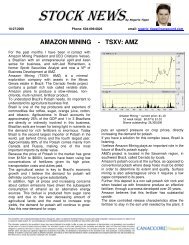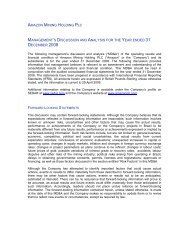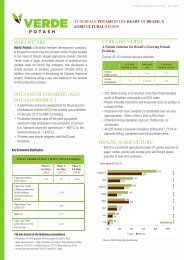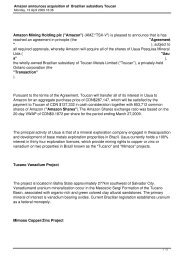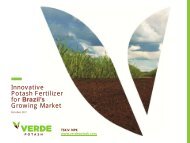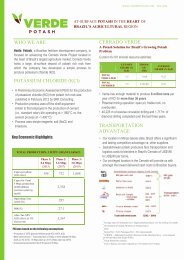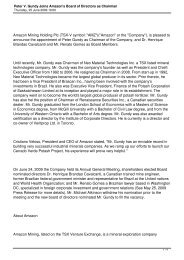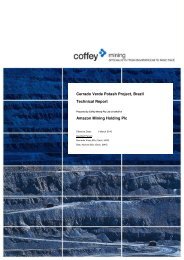Verde fertilizantes - Verde Potash Plc
Verde fertilizantes - Verde Potash Plc
Verde fertilizantes - Verde Potash Plc
Create successful ePaper yourself
Turn your PDF publications into a flip-book with our unique Google optimized e-Paper software.
Conventional<br />
<strong>Potash</strong> from<br />
Open Pit project<br />
in the Heart of Brazil’s<br />
Agriculture Region<br />
TSX: NPK<br />
www.verdepotash.com August/2012
Disclaimer<br />
This presentation contains certain “forward looking statements”, which include but is not limited to, statements with<br />
respect to the future financial or operating performance of <strong>Verde</strong> <strong>Potash</strong> <strong>Plc</strong> (the “Company”), its subsidiaries and<br />
its projects, statements regarding use of proceeds, exploration prospects, identification of mineral reserves, costs<br />
of and capital for exploration projects, exploration expenditures, timing of future exploration and permitting,<br />
requirements for additional capital, government regulations of mining operations, environmental risks, reclamation<br />
expenses, title disputes or claims, and limitations of insurance coverage, statements with respect to the results of<br />
the PEA, anticipated production levels and timing of commencement of production, long term KCl prices,<br />
production life, and costs and completion of a feasibility study. Forward looking statements can generally be<br />
identified by the use of words such as “plans”, “expects”, or “does not expect” or “is expected”, “anticipates” or<br />
“does not anticipate”, or “believes”, “intends”, “forecasts”, “budget”, “scheduled”, “estimates” or variations of such<br />
words or phrases or state that certain actions, event, or results “may”, “could”, “would”, “might”, or “will be taken”,<br />
“occur” or “be achieved”. Forward looking statements involve known and unknown risks, uncertainties and other<br />
factors which may cause the actual results, performance or achievements of the Company to be materially different<br />
from any future results, performance or achievements expressed or implied by said statements. There can be no<br />
assurances that forward-looking statements will prove to be accurate, as actual results and future events could<br />
differ materially from those anticipated in said statements. Accordingly, readers should not place undue reliance on<br />
forward-looking statements.<br />
Total resources include all categories unless otherwise stated. All currency are in Canadian $ unless otherwise<br />
stated.<br />
TSX : NPK<br />
2
<strong>Verde</strong>: Made in Brazil, listed on TSX (NPK)<br />
• ~ C$29 Million in Cash, no debt<br />
• Significant South America based ownership including entrepreneurs behind<br />
one of the world’s most successful fertilizer companies<br />
• 40,235,077 shares fully diluted<br />
• 52 week: Hi/Lo C$9.37/C$2.67<br />
• 11 independent analysts with share price targets up to C$20<br />
• Management Team has successfully built and operated similar projects<br />
TSX: NPK<br />
3
Management<br />
Cristiano Veloso Founder, President, CEO<br />
• 13 years experience; Brazilian entrepreneur ex Banco do Brasil S/A, CEMIG; LL.B, LL.M International Business Law<br />
Pedro Ladeira Chief Operating Officer<br />
• 17 years experience; ex Operations Director, Process and Production Manager for Holcim Brazil<br />
Rubens Mendonça VP Mining<br />
• 27 years experience; ex Senior Mining Engineer at Vale; consultant at Snowden Mining and Paulo Abib Engenharia S.A.<br />
Patricia Radino -Rouse VP Engineering<br />
• 40 years experience; ex Senior Process Engineer and manager for Paulo Abib Engenharia, responsible for supervision of<br />
a 1.5Mtpy feasibility study for potassium sulphate project for Petrobras<br />
Jed Richardson VP Corporate Development<br />
• 10 years experience; ex Mining Analyst with Sprott/Cormark and RBC Capital Markets, Mining engineer with Alcan<br />
Aluminium<br />
Ysao Munemassa Exploration Director<br />
• 41 years experience; ex BP Minerals, VALE, Union Carbide, INCO, Teck Cominco, Newmont Gold<br />
Derek Fray Metallurgical Consultant<br />
• 45 years experience; University of Cambridge Professor & Director of Research<br />
Rodolfo Silva Pilot Plant Manager<br />
• 17 years experience; past experience includes work with Usiminas S/A, Magnesita Refratários S/A, Vilma Alimentos and<br />
AMBEV<br />
Eduardo Spolidorio Marketing Manager<br />
• 14 years experience; past experience includes work with Honeywell, Bunge, Mosaic and Heringer<br />
TSX : NPK<br />
4
Independent Directors<br />
Peter Gundy Chairman<br />
• Former Chairman of Neo Materials Technologies Inc.; VP of Brascan Inc; Executive VP, Finance of<br />
<strong>Potash</strong> Corporation of Saskatchewan Limited<br />
Richard Garnett<br />
• PhD. in Economic Geology (Royal School of Mines, UK), MBA (Cranfield University, UK); Mining<br />
Engineer. Has held senior positions with Rio Tinto, Anglo American, Hudson Bay Mining and Diamond<br />
Fields Resources<br />
Getulio Lamartine de Paula Fonseca<br />
• Former General Director National Department of Power & Water Supply; Executive-Secretary Industry<br />
& Commerce Ministry<br />
Henrique Brandão Cavalcanti<br />
• Former Brazil’s Minister of the Environment (1994), Deputy Minister of Mines Energy (1967-69), Deputy<br />
Minister of Interior (1969-74).<br />
Renato Gomes<br />
• Director of the ABCI Institute (Brazilian International Trade Scholars) Lawyer and member of Brazilian<br />
and Portuguese Bar Associations<br />
TSX : NPK<br />
5
2011<br />
2010<br />
2009<br />
2008<br />
2007<br />
2006<br />
2005<br />
2004<br />
2003<br />
2002<br />
2001<br />
2000<br />
1999<br />
1998<br />
1997<br />
1996<br />
1995<br />
1994<br />
1993<br />
1992<br />
1991<br />
1990<br />
1989<br />
1988<br />
1987<br />
1986<br />
1985<br />
1984<br />
1983<br />
1982<br />
'000 tonnes nutrients<br />
Millions of Hectares<br />
Brazil’s Growing <strong>Potash</strong> Consumption<br />
Brazil KCl consumption<br />
(last 30 years)<br />
600<br />
Undeveloped Potential Arable Land<br />
9,000<br />
8,000<br />
7,000<br />
6,000<br />
CAGR: 7.00%<br />
500<br />
400<br />
Available<br />
Planted<br />
5,000<br />
4,000<br />
3,000<br />
2,000<br />
1,000<br />
-<br />
300<br />
200<br />
100<br />
0<br />
Brazil US Russia China India<br />
Source: FAO 2000 Land Resource Potential – Terrastat database<br />
TSX: NPK<br />
6
Brazil imports more than 90% of its <strong>Potash</strong> Consumption<br />
SOC.QUIM.MIN.CHILE<br />
PCS<br />
KALI UND SALZ<br />
2011 Consumption<br />
Imports: 7.4M<br />
Domestic: 0.6M<br />
IBER POTASH<br />
DEAD SEA WORKS<br />
CLEVELAND POTASH<br />
CANPOTEX<br />
BPC<br />
AMEROPA<br />
0 500,000 1,000,000 1,500,000 2,000,000 2,500,000 3,000,000<br />
Source: Sindicato da Industria de Adubos e Corretivos Agricolas no Estado de Sao Paulo.<br />
Volume (mt)<br />
TSX: NPK<br />
7
<strong>Verde</strong> has Enough <strong>Potash</strong> in the Brazilian Cerrado<br />
from Surface for Decades<br />
Mineral Resources Tonnage (Mt) Avg. K 2 O Grade<br />
Total Indicated<br />
(7.5% K 2 O cut off grade)<br />
Total Inferred<br />
(7.5% K 2 O cut off grade)<br />
71.08 9.2%<br />
2,763.8 8.9%<br />
TSX: NPK<br />
8
Location, Location, Location<br />
9
Production Process: Keep it Simple<br />
Open Pit Mine<br />
Operation<br />
Rotary Kiln<br />
Evaporation/<br />
Crystallization Plant<br />
KCl Product<br />
TSX: NPK<br />
10
Tested from Lab to Industrial Scale<br />
TSX: NPK<br />
11
$3.3 Billion NPV, 27% IRR and $598M initial CAPEX<br />
Base Case Scenario<br />
Total KCl Production: 3 Mtpy<br />
Capex per Phase (USD million)<br />
Capex for Total Production (USD<br />
million) (excludes sustaining<br />
capital)<br />
Phase 1 (2015)<br />
0.6 Mtpy<br />
Phase 2 (2017)<br />
+ 1.0 Mtpy<br />
Phase 3 (2019)<br />
+ 1.4 Mtpy<br />
598 732 1,008<br />
2,338<br />
Operating Costs (USD/t KCl)<br />
IRR (%)<br />
After Tax NPV (USD million), at<br />
10% discount rate<br />
285<br />
27<br />
3,367<br />
• Completed by SRK Consulting Feb 2012<br />
• Production of 100% granular fertilizer grade KCl (60% K 2 O)<br />
• CAPEX includes 25% contingency<br />
• Study assumes an average long term Vancouver FOB KCl granular price of US$559 per tonne and<br />
US$475 from 2015-20 (CRU Market Research 2012)<br />
TSX: NPK<br />
12
Capital Cost ($/mt)<br />
$192<br />
$375<br />
$375<br />
$433<br />
$500<br />
$506<br />
$540<br />
$550<br />
$573<br />
$625<br />
$714<br />
$714<br />
$739<br />
$790<br />
$794<br />
$833<br />
$850<br />
$928<br />
$938<br />
$943<br />
$967<br />
$986<br />
$1,037<br />
$1,067<br />
$1,071<br />
$1,120<br />
$1,136<br />
$1,150<br />
$1,176<br />
$1,200<br />
$1,372<br />
$1,383<br />
$1,388<br />
$1,400<br />
$1,500<br />
$1,556<br />
$1,750<br />
…. Cheaper to Build and Scalable<br />
$2,000<br />
$1,800<br />
Greenfield<br />
Brownfield<br />
$1,600<br />
$1,400<br />
$1,200<br />
$1,000<br />
Greenfield Average: US$ 980.50/mt<br />
Average: US$ 923.54/mt<br />
$800<br />
Brownfield Average: US$ 818.38/mt<br />
$600<br />
$400<br />
$200<br />
$0<br />
Source: Scotia Capital<br />
TSX: NPK<br />
13
Imported KCl is expensive to deliver in the Brazilian<br />
Cerrado<br />
• Blenders in Brazil incur significant transportation costs in importing KCl from<br />
foreign producers<br />
Shipping from Saskatchewan to Blenders in Brazil ($/tonne)<br />
Demurrage<br />
$5-10<br />
AFRMM<br />
$43 1 $33 $44-108<br />
$8<br />
Saskatchewan Port of Vancouver Port in Brazil 3<br />
NPK Blenders<br />
Port Costs<br />
$26-43 2<br />
Financial Cost<br />
$10<br />
1<br />
Government of Canada, Ministry of Transportation<br />
2<br />
Santos Port = $43; Paranaguá Port = $26<br />
3<br />
AFRMM = Additional Freight for Renewal of the Merchant Navy : an extra tax imposed by the Brazilian government payable<br />
upon inbound freights<br />
4<br />
CRU<br />
Total: $174-249/tonne 4<br />
In addition to the price of KCl, blenders<br />
pay additional shipping costs when<br />
purchasing KCl from Saskatchewan<br />
producers<br />
TSX : NPK<br />
14
US$ (Billions)<br />
Brazilian Government Commitment<br />
100<br />
BNDES Gross Lending<br />
90<br />
80<br />
70<br />
60<br />
50<br />
40<br />
30<br />
20<br />
10<br />
0<br />
2007 2008 2009 2010 2011<br />
Minas Gerais State Governor, Antonio Augusto, and<br />
Cristiano Veloso, <strong>Verde</strong> <strong>Potash</strong>’s CEO<br />
TSX : NPK<br />
15
Key Milestones<br />
2012 2013 2014 2015<br />
Q2 Q3 Q4 Q1 Q2 Q3 Q4<br />
Preliminary Environmental Permit<br />
Studies and work prior to the<br />
Definitive Feasibility Study<br />
DFS<br />
Installation Permit<br />
Funding<br />
Basic Engineering<br />
Detailed Engineering<br />
Operation Permit<br />
Equipment Procurement<br />
Construction<br />
Project Start-up<br />
16
Why Invest?<br />
• Project offers robust economics<br />
• No need to raise funds until construction decision<br />
• Location, Location, Location<br />
• Project construction and operation expertise<br />
• Scalable project<br />
TSX: NPK<br />
17
Appendix<br />
18
Analyst Coverage<br />
Company Analyst Contact Details<br />
AltaCorp Capital John Chu +1 (647) 776-8236<br />
Fraser Mackenzie Peter Prattas +1 (416) 560-3275<br />
GMP Securities Anoop Prihar +1 (416) 367-8600<br />
Kaiser Research John Kaiser +1 (925) 631-9748<br />
Mackie Research Capital Jaret Anderson +1 (416) 860-6784<br />
MGI Securities Corey Dias +1 (416) 864-2619<br />
National Bank Robert Winslow +1 (416) 847-3403<br />
Ocean Equities Adam Lucas +44 (0) 207 786 4370<br />
Paradigm Capital Spencer Churchill +1 (416) 361-6056<br />
Salman Partners Andrea Rubakovic +1 (416) 861-9387<br />
Stifel Nicolaus Nick Morton +1 (416) 815-1546<br />
19
Crawling<br />
University of Cambridge - UK<br />
20
Walking<br />
Hazen Research – Denver, CO<br />
21
Jogging<br />
<strong>Verde</strong> <strong>Potash</strong> – Pilot Plant in Brazil<br />
22
Running<br />
FLSmidth – Allentown, PA<br />
23
<strong>Verde</strong>’s KCl Cost Breakdown<br />
Raw Materials<br />
TSX : NPK<br />
24
High Quality Limestone for KCl Production<br />
Resource<br />
Category<br />
Tonnage<br />
(Mt)<br />
Avg. Grade<br />
(CaO)<br />
Indicated 89 54.71%<br />
Inferred 180 54.65%<br />
Limestone drill core<br />
TSXv : NPK<br />
25
<strong>Potash</strong> is essential for energy in Brazil<br />
Sugarcane<br />
• Uses 160kg/ha of potash<br />
per year, 55% of total<br />
nutrient required (In<br />
comparison, corn uses<br />
140kg/ha of potash, 31%<br />
of req’d nutrient)<br />
• Sugarcane is grown in<br />
about 8 million hectares of<br />
land, of which 55% of the<br />
harvest is used for ethanol<br />
production<br />
Milling and Refining<br />
• Once harvested, sugarcane<br />
is milled to collect the<br />
juice that contain 10-15%<br />
sucrose<br />
• Juice is filtered and refined<br />
Ethanol Production<br />
• Ethanol is produced by<br />
microbial fermentation of<br />
the sugar<br />
• Water is removed by<br />
distillation and dehydration<br />
Electricity Generation<br />
•Bagasse is burned to generate<br />
electricity for production<br />
plant and grid<br />
Ethanol<br />
replaces about<br />
50% of the fuel<br />
needed to<br />
operate light<br />
vehicles on<br />
gasoline<br />
Bagasse power<br />
generation<br />
represents<br />
4.1% of total<br />
installed<br />
capacity<br />
Ethanol Production Cost<br />
Sugarcane (Brazil): $0.83<br />
Corn (US): $1.14<br />
Ratio energy input to manufacture<br />
to energy output of ethanol<br />
Sugarcane (Brazil): 1:9.3<br />
Corn (US): 1:1.4<br />
Sources: Renewable Fuels Association, World Bank, Wikipedia<br />
TSXv : NPK<br />
26
<strong>Potash</strong> Rock vs. Oil Sands<br />
Oil Sands<br />
<strong>Potash</strong> Rock<br />
Commodity Crude oil <strong>Potash</strong><br />
Potential Resource 170 billion barrels of oil equivalent 2.68 billion tonnes<br />
Cause for<br />
development<br />
Life Stage<br />
Key Companies<br />
• Dependence on oil imports in the 1970s<br />
• Rising price of oil making the projects<br />
economic<br />
45 companies developing 82 projects;<br />
25 projects in operation<br />
Major International Oil Companies<br />
Suncor, Nexen, Cenovus, Husky<br />
• Dependence on potash imports in<br />
Brazil with growing agriculture<br />
industry<br />
<strong>Verde</strong>: feasibility study in development<br />
<strong>Verde</strong> <strong>Potash</strong><br />
Sector Value C$120 billion C$275 million<br />
Oil sands<br />
• Oil sands now an accepted source of crude oil shows the potential our new source of potash<br />
• Oil sands deposits were developed because of increasing dependence on oil imports; Brazil’s<br />
dependence on potash imports can be reduced by this development<br />
• In 30 years, oil sands emerged from a niche technology to a mainstream source of oil, supplying<br />
6.6% of U.S. oil consumption. Our potash rock may follow suit, providing an answer for growing<br />
global potash need in the future<br />
Sources: Canadian Association of Petroleum Producers, Wikipedia<br />
TSXv : NPK<br />
27
KCl vs Thermo<strong>Potash</strong><br />
Why the shift in focus from Thermo<strong>Potash</strong>?<br />
1) Thermo<strong>Potash</strong> is an excellent project which <strong>Verde</strong> intends to produce<br />
alongside KCl;<br />
2) Thermo<strong>Potash</strong> is an excellent business, but it is a materially smaller<br />
business than KCl:<br />
‣ A two million tonne per year Thermo<strong>Potash</strong> operation could generate<br />
approximately US$300 million of revenue;<br />
‣ A three million tonne per year KCl operation could generate closer to<br />
US$2.0 billion of revenue;<br />
3) KCl is a well understood product with well-established demand (55Mt of<br />
global demand). Thermo<strong>Potash</strong> is an innovative product and although we<br />
have received positive feedback from Brazilian farmers and blenders,<br />
there is currently no established demand for Thermo<strong>Potash</strong>.<br />
28
TSX-V:NPK<br />
www.verdepotash.com<br />
TSX:NPK<br />
www.verdepotash.com




